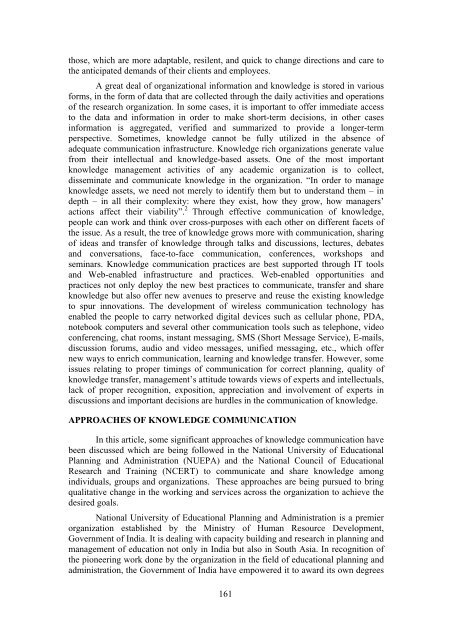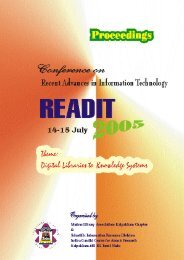READIT-2007 - Indira Gandhi Centre for Atomic Research
READIT-2007 - Indira Gandhi Centre for Atomic Research
READIT-2007 - Indira Gandhi Centre for Atomic Research
You also want an ePaper? Increase the reach of your titles
YUMPU automatically turns print PDFs into web optimized ePapers that Google loves.
those, which are more adaptable, resilent, and quick to change directions and care to<br />
the anticipated demands of their clients and employees.<br />
A great deal of organizational in<strong>for</strong>mation and knowledge is stored in various<br />
<strong>for</strong>ms, in the <strong>for</strong>m of data that are collected through the daily activities and operations<br />
of the research organization. In some cases, it is important to offer immediate access<br />
to the data and in<strong>for</strong>mation in order to make short-term decisions, in other cases<br />
in<strong>for</strong>mation is aggregated, verified and summarized to provide a longer-term<br />
perspective. Sometimes, knowledge cannot be fully utilized in the absence of<br />
adequate communication infrastructure. Knowledge rich organizations generate value<br />
from their intellectual and knowledge-based assets. One of the most important<br />
knowledge management activities of any academic organization is to collect,<br />
disseminate and communicate knowledge in the organization. “In order to manage<br />
knowledge assets, we need not merely to identify them but to understand them – in<br />
depth – in all their complexity: where they exist, how they grow, how managers’<br />
actions affect their viability”. 2 Through effective communication of knowledge,<br />
people can work and think over cross-purposes with each other on different facets of<br />
the issue. As a result, the tree of knowledge grows more with communication, sharing<br />
of ideas and transfer of knowledge through talks and discussions, lectures, debates<br />
and conversations, face-to-face communication, conferences, workshops and<br />
seminars. Knowledge communication practices are best supported through IT tools<br />
and Web-enabled infrastructure and practices. Web-enabled opportunities and<br />
practices not only deploy the new best practices to communicate, transfer and share<br />
knowledge but also offer new avenues to preserve and reuse the existing knowledge<br />
to spur innovations. The development of wireless communication technology has<br />
enabled the people to carry networked digital devices such as cellular phone, PDA,<br />
notebook computers and several other communication tools such as telephone, video<br />
conferencing, chat rooms, instant messaging, SMS (Short Message Service), E-mails,<br />
discussion <strong>for</strong>ums, audio and video messages, unified messaging, etc., which offer<br />
new ways to enrich communication, learning and knowledge transfer. However, some<br />
issues relating to proper timings of communication <strong>for</strong> correct planning, quality of<br />
knowledge transfer, management’s attitude towards views of experts and intellectuals,<br />
lack of proper recognition, exposition, appreciation and involvement of experts in<br />
discussions and important decisions are hurdles in the communication of knowledge.<br />
APPROACHES OF KNOWLEDGE COMMUNICATION<br />
In this article, some significant approaches of knowledge communication have<br />
been discussed which are being followed in the National University of Educational<br />
Planning and Administration (NUEPA) and the National Council of Educational<br />
<strong>Research</strong> and Training (NCERT) to communicate and share knowledge among<br />
individuals, groups and organizations. These approaches are being pursued to bring<br />
qualitative change in the working and services across the organization to achieve the<br />
desired goals.<br />
National University of Educational Planning and Administration is a premier<br />
organization established by the Ministry of Human Resource Development,<br />
Government of India. It is dealing with capacity building and research in planning and<br />
management of education not only in India but also in South Asia. In recognition of<br />
the pioneering work done by the organization in the field of educational planning and<br />
administration, the Government of India have empowered it to award its own degrees<br />
161

















